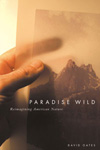
Excerpts from Paradise Wild
The following are excerpts from Paradise Wild: Reimagining American Nature, by David Oates (Oregon State University Press, February 2003).
* * * * *
In the nineteenth century, a mythic Eden came to be relocated into a literal place, or a series of places – paradises all too losable – lost and lost again as the frontier moved inexorably west, a vestigial spiritual ideal, drowned at last in the Pacific.
* * * * *
Eden is a myth that has ended up telling its tellers, speaking through them without their ability to see it or to imagine any other words, or worlds. But we cannot afford to let this storyline use us any more. It is time to bring it into consciousness, recognize it as a historical artifact, and move to other ground. For the immediate political gains we make in using the Eden-and-Apocalypse language are paid for with long-term defeat. Like Muir, we find we cannot live in Eden, and that however “saved” it is, it is somewhere else. We trudge in a flat and dusty world, separated and alienated (as all the nature writers declare) from a vital connection with the world. Eden can’t be saved unless we are, too. Our fates are intertwined. We must re-imagine what Eden means.
* * * * *
No new myth emerges, despite the breathless announcements that it’s almost here, it’s happening, here it comes. It never does. We’re left like Millerites on hilltops in our Deep Ecology bedsheets. Eden is still lost. And we are still to blame.
* * * * *
If it was my myth, I’d give her an onion. And I’d have God say – Take a BIG bite. This would improve things in several ways. First, onions don’t grow on trees, so there’d be no question of literalizing the story. Second, there’s the peeling…that’s a good model for how the world works, or rather how we work the world. Much more interesting than the clear-through-ness of an apple. And, onions do have their own paradoxical sweetness. Along with the tears. Eve plucks one from the ol’ onion tree. She bites, she cries, she peels, she laughs. God looks on approvingly. Adam smells her breath, wonders what’s up, kisses her anyway. And the rest is history.
* * * * *
What shall we do then? How shall we live in the world? It will take an army of environmentalists with chainsaws to drive the Weyerhaeusers from the forests. Clear-eyed, idealistic, and ready to kill trees.
* * * * *
A sacred space is a metaphor: it says Eden, but is not Eden. If it burns or gets bulldozed, Eden is not threatened. Though we are rightly distressed, the right action is to rebuild the temple, consecrate it, and get back into the business of metaphoring, of playing both sides of the street. Of course, that game (like any game) requires making lots of decisions – where to use, where to rest, where to make sacred. Everywhere is not church – we don’t want Christmas every day – so outside the symbolic park-edens, we will probably need to follow Ashworth’s advice after all: finding the right forests, enlisting that army of environmentalists with chainsaws, but leaving the place intact. Chainsawed but intact? That paradox will take some powerful imagining. A comical, tragical, dirty-handed delicacy.
* * * * *
In every leaf of grass there is a green door. For a long time we have been urged to go in that door. But somehow, we can’t. We read our Muirs and take our walks but we never get there. Come in, come in, they say, dreamlike, and we try so hard…then wake to city streets and disappointment. It seems to me we never will get in that green door. Because we are already there. We are already inside of nature, we ourselves are the inside, the inwardness of nature, if anyone is. What we had better do instead is turn around and look out the green door. Then we will see ourselves, looking down at ourselves in wonder; then we will see clearly, it is ourselves we must kill, and ourselves we must save, all at the same time. And there’s no opting out; for that is how the world works, the physical as much as the spiritual. Dying to be reborn. Dying daily, resurrecting daily. It is up to us, simply, to do it well. Tool up, brothers and sisters. This is real work.
* * * * *
Read the opening chapter, “The Practice of the Presence of the Wild.”